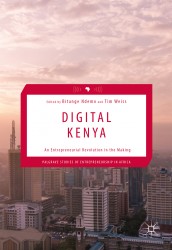Landmark Publication from Bitange Ndemo and Tim Weiss Lifts Lid on the Intersection Between Entrepreneurialism and Kenya’s Impactful ICT Sector

Nairobi. Tuesday 13 December 2016. ‘Digital Kenya, An Entrepreneurial Revolution in the Making’, is a landmark publication analysing Kenya’s world-famous ICT sector and the economic factors, entrepreneurs, trends and innovations that have shaped the East African tech hub into what it is today – a thriving entrepreneurial sector at an unprecedented scale. The new book, now available as an open-source digital download and in print, is the first of its kind to offer key insights into a single African country’s technology story.
Published by Palgrave Macmillan and edited by Kenya’s former permanent secretary for ICT, Professor Bitange Ndemo and Stanford University-based Tim Weiss, Digital Kenya has been developed to critically assess the cultural, economic and political forces at play for the “Silicon Savannah,” and to calibrate, in detail, the ‘Kenya’ story. Across 15 chapters and 14 one-on-one interviews, Digital Kenya asks why establishing ICT start-ups on a continental and global scale remains a challenge and looks at what powers the globally celebrated Kenyan success stories of the likes of the iHub, BRCK, M-Pesa and M-Kopa, all of whom have been instrumental in playing out Kenya’s tech narrative on an international stage.
The warts and all approach of Digital Kenya’s editors makes for compelling reading, as many of the sector’s most well respected, battle-hardened entrepreneurs and business people reveal the challenges they have faced, the opportunities they have lost out on and, importantly, their take on the future of this emerging tech landscape. The publication comes just a few short months after Facebook’s Mark Zuckerberg’s surprise visit to Kenya, a firm acknowledgement that the investments that have been made in the ICT sector will hugely payoff. His visit validated the innovations that have come out of Kenya, as well as stimulating confidence among the country’s young people.
The chapters and interviews detail remarkable insights from leading lights of the sector. Professor Ndemo’s insider perspective brings the policy process behind “Silicon Savannah” to the fore. This analysis is paired with a compelling interview with Ory Okolloh that assesses how public policy affects entrepreneurs’ business reality. Another intriguing contribution by social media expert Mark Kaigwa focuses on how Kenyans have harnessed the power of social media and managed to create a powerful voice with profound implications for Kenyans. Further, the book introduces Africa’s first venture builder and talks with the co-founders Jessica Colaço and Ibanga Umanah about their unique strategy to build scalable businesses. In addition, several contributions from management, communications and economic geography scholars shed light into why setting up a technology business in Kenya is a peculiar challenge, despite support from growing numbers of motivated entrepreneurs, innovation hubs, and interested seed capital investors.
Bitange Ndemo, Digital Kenya co-editor says: “Kenya’s ICT sector is booming, with unimaginable potential, producing some of the most disruptive innovations on the continent. However, entrepreneurs are still faced with significant challenges when it comes to scaling their businesses, and we felt compelled to find out why, by collating insight and analysis from expert voices working in the area. Digital Kenya is documenting the Kenyan ICT journey, not only to spark lively debate, but also to provide a stable reference point from which investors, academics, students and commentators can make better informed decisions about how they interact with and embrace Kenya’s technology eco-system.”
The unique resource, with guest contributions from Kenya’s leading ICT industry experts, provides a frank and open forum to push the debate around entrepreneurship and technology forward and explores how the new wave of African entrepreneurship has emerged. The book presents evidence-based recommendations and puts solution approaches on display to help Kenya continue to produce globally impactful ICT innovations, and serves as a go-to resource for those with interest in “Silicon Savannah.”
About the Authors
Bitange Ndemo is Professor of Entrepreneurship at the University of Nairobi, Kenya, and the former Permanent Secretary of Kenya’s Ministry of Information and Communication. In his previous role he transformed the country’s ICT sector through initiating international and countrywide fiber optic connectivity, conceptualizing Kenya’s first technology cluster, and facilitating M-Pesa.
Tim Weiss is an academic researcher at the Center for Work, Technology and Organization of Stanford University. He has carried out an in-depth qualitative study of technology entrepreneurship in Kenya by interviewing over 150 industry participants with the goal to shed light into the inner workings of a thriving entrepreneurial sector. His newest research focuses on the impact of today’s global trends on the lives and organizations of Africans and on Africa’s unique responses to grand global challenges. In particular, he investigates Kenya’s financial infrastructure, international development aid organizations and radical global innovations.




